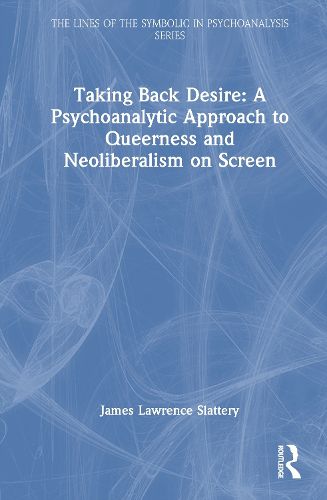Readings Newsletter
Become a Readings Member to make your shopping experience even easier.
Sign in or sign up for free!
You’re not far away from qualifying for FREE standard shipping within Australia
You’ve qualified for FREE standard shipping within Australia
The cart is loading…






Taking Back Desire studies film, television and video art texts through a Lacanian prism to restore a sense of queer as troubling identity and resistance to neoliberal forms of inclusion.
James Lawrence Slattery illuminates how the framing of desire, identity, enjoyment, resistance and knowledge contribute to the investment in neoliberal formations of being and success, despite the corrosive effects neoliberalism has had for much of society. The book does not read queerness on screen as a discernible group of characters or narrative formulas, but as a point that meaning fails in the visual and temporal field. Examining the interrelation of the real, the imaginary, and the symbolic in contemporary politics and contemporary media, Slattery investigates how a diverse selection of moving image texts forge queerness as a relationship to the lack, while crucially resisting the creation of a new or definitive 'canon'.
Taking Back Desire will be essential reading for academics and scholars of Freudian and Lacanian psychoanalysis, queer theory, late capitalism, film, television and media studies, sexuality studies, critical race theory, cultural studies and feminist theory.
$9.00 standard shipping within Australia
FREE standard shipping within Australia for orders over $100.00
Express & International shipping calculated at checkout
Taking Back Desire studies film, television and video art texts through a Lacanian prism to restore a sense of queer as troubling identity and resistance to neoliberal forms of inclusion.
James Lawrence Slattery illuminates how the framing of desire, identity, enjoyment, resistance and knowledge contribute to the investment in neoliberal formations of being and success, despite the corrosive effects neoliberalism has had for much of society. The book does not read queerness on screen as a discernible group of characters or narrative formulas, but as a point that meaning fails in the visual and temporal field. Examining the interrelation of the real, the imaginary, and the symbolic in contemporary politics and contemporary media, Slattery investigates how a diverse selection of moving image texts forge queerness as a relationship to the lack, while crucially resisting the creation of a new or definitive 'canon'.
Taking Back Desire will be essential reading for academics and scholars of Freudian and Lacanian psychoanalysis, queer theory, late capitalism, film, television and media studies, sexuality studies, critical race theory, cultural studies and feminist theory.